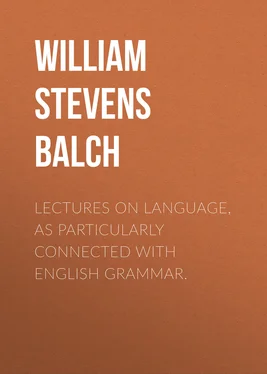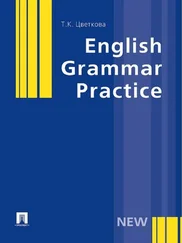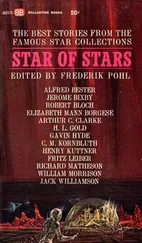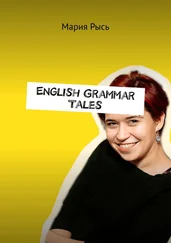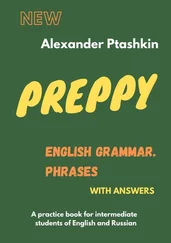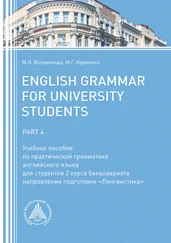William Stevens Balch - Lectures on Language, as Particularly Connected with English Grammar.
Здесь есть возможность читать онлайн «William Stevens Balch - Lectures on Language, as Particularly Connected with English Grammar.» — ознакомительный отрывок электронной книги совершенно бесплатно, а после прочтения отрывка купить полную версию. В некоторых случаях можно слушать аудио, скачать через торрент в формате fb2 и присутствует краткое содержание. Жанр: foreign_edu, foreign_language, на английском языке. Описание произведения, (предисловие) а так же отзывы посетителей доступны на портале библиотеки ЛибКат.
- Название:Lectures on Language, as Particularly Connected with English Grammar.
- Автор:
- Жанр:
- Год:неизвестен
- ISBN:нет данных
- Рейтинг книги:3 / 5. Голосов: 1
-
Избранное:Добавить в избранное
- Отзывы:
-
Ваша оценка:
- 60
- 1
- 2
- 3
- 4
- 5
Lectures on Language, as Particularly Connected with English Grammar.: краткое содержание, описание и аннотация
Предлагаем к чтению аннотацию, описание, краткое содержание или предисловие (зависит от того, что написал сам автор книги «Lectures on Language, as Particularly Connected with English Grammar.»). Если вы не нашли необходимую информацию о книге — напишите в комментариях, мы постараемся отыскать её.
Lectures on Language, as Particularly Connected with English Grammar. — читать онлайн ознакомительный отрывок
Ниже представлен текст книги, разбитый по страницам. Система сохранения места последней прочитанной страницы, позволяет с удобством читать онлайн бесплатно книгу «Lectures on Language, as Particularly Connected with English Grammar.», без необходимости каждый раз заново искать на чём Вы остановились. Поставьте закладку, и сможете в любой момент перейти на страницу, на которой закончили чтение.
Интервал:
Закладка:
I will not be particular in my remarks upon the changes of spoken and written language, altho that topic of itself, in the different sounds and signs employed in different ages and by different nations to express the same idea, would form a most interesting theme for several lectures. But that work must be reserved for a future occasion. You are all acquainted with the signs, written and spoken, which are employed in our language as vehicles (some of them like omnibusses) of thought to carry ideas from one mind to another. Some of you doubtless are acquainted with the application of this fact in other languages. In other words, you know how to sound the name of a thing, how to describe its properties as far as you understand them, and its attitudes or changes. This you can do by vocal sounds, or written, or printed signs.
On the other hand, you can receive a similar impression by hearing the description of another, or by seeing it written or printed. But here you will bear in mind the fact that the word, spoken or written, is but the sign of the idea derived from the thing signified. For example: Here is an apple. I do not now speak of its composition, the skin, the pulp, &c.; nor of its qualities, whether sour, or sweet, or bitter, good or bad, great or small, long or short, round or flat, red, or white, or yellow. I speak of a single thing—an apple. Here it is, present before you. Look at it. It is now removed. You do not see it. Your minds are occupied with something else, in looking at that organ, or this representation of Solomon's temple, or, perhaps, lingering in melancholy review of your old systems of grammar thro which you plodded at a tedious rate, goaded on by the stimulus of the ferule, or the fear of being called ignorant. From that unhappy reverie I recal your minds, by saying apple . An apple? where? There is none in sight. No; but you have distinct recollections of a single object I just now held before you. You see it, mentally, and were you painters you might paint its likeness. What has brought this object so vividly before you? The single sound apple . This sound has called up the idea produced in your mind on looking at this object which I now again present before you. Here is the thing represented—the apple. Again I lay it aside, and commence a conversation with you on the varieties of apples, the form, color, flavor, manner of production, their difference from other fruit, where found, when, and by whom. Here! look again. What do you see? A-P-P-L-E— Apple . What is that? The representation of the idea produced in the mind by a certain object you saw a little while ago. Here then you have the spoken and written signs of this single object I now again present to your vision. This idea may also be called up by the sense of feeling, smelling, or tasting, under certain restrictions. Here you would be no more liable to be mistaken than by seeing. We can indeed imagine things which would feel, and smell, and taste, and look some like an apple, but it falls to the lot of more abstruse reasoners to make their suppositions, and then account for them—to imagine things, and then treat of them as realities. We are content with the knowledge of things as they do exist, and think there is little danger of mistaking a potato for an apple, or a squash for a pear. Tho in the dark we may lay hold of the Frenchman's pomme de terre —apple of the earth, the first bite will satisfy us of our mistake if we are not too metaphysical.
The same idea may be called up in your minds by a picture of the apple presented to your sight. On this ground the picture writing of the ancients may be accounted for; and after that, the hieroglyphics of Egypt and other countries, which was but a step from picture writing towards the use of the alphabet. But these signs or vehicles for the conveyance or transmission of their thoughts, compared with the present perfect state of language, were as aukward and uncomly as the carriages employed for the conveyance of their bodies were compared with those now in use. They were like ox carts drawn by mules, compared with the most splendid barouches drawn by elegant dapple-greys.
A similar mode would be adopted now by those unacquainted with alphabetical writing. It was so with the merchant who could not write. He sold his neighbor a grindstone, on trust. Lest he should forget it—lest the idea of it should be obliterated from the mind—he, in the absence of his clerk, took his book and a pen and drew out a round picture to represent it. Some months after, he dunned his neighbor for his pay for a cheese. "I have bought no cheese of you," was the reply. Yes, you have, for I have it charged. "You must be mistaken, for I never bought a cheese. We always make our own." How then should I have one charged to you? "I cannot tell. I have never had any thing here on credit except a grindstone." Ah! that's it, that's it, only I forgot to make a hole through it!"
Ideas may also be exchanged by actions. This is the first and strongest language of nature. It may be employed, when words have failed, in the most effectual manner. The angry man, choked with rage, unable to speak, tells the violent passions, burning in his bosom, in a language which can not be mistaken. The actions of a friend are a surer test of friendship than all the honied words he may utter. Actions speak louder than words. The first impressions of maternal affection are produced in the infant mind by the soothing attentions of the mother. In the same way we may understand the language of the deaf and dumb. Certain motions express certain ideas. These being duly arranged and conformed to our alphabetic signs, and well understood, the pupil may become acquainted with book knowledge as well as we. They go by sight and not by sound. A different method is adopted with the blind. Letters with them are so arranged that they can feel them. The signs thus felt correspond with the sounds they hear. Here they must stop. They cannot see to describe. Those who are so unfortunate as to be blind and deaf, can have but a faint knowledge of language, or the ideas of others.
On similar principles we may explain the pantomime plays sometimes performed, where the most entertaining scenes of love and murder are represented, but not a word spoken.
Three things are always to be born in mind in the use and study of all language: 1st, the thing signified; 2d, the idea of the thing; and 3d, the word or sign chosen to represent it.
Things exist.
Thinking beings conceive ideas of things .
Those who employ language adopt sounds or signs to convey those ideas to others.
On these obvious principles rest the whole superstructure of all language, spoken or written. Objects are presented to the mind, impressions are there made, which, retained, constitute the idea, and, by agreement, certain words are employed as the future signs or representations of those ideas. If we saw an object in early life and knew its name , the mention of that name will recal afresh the idea which had long lain dormant in the memory, (if I may so speak,) and we can converse about it as correctly as when we first saw it.
These principles, I have said, hold good in all languages. Proof of this may not improperly be offered here, provided it be not too prolix. I will endeavor to be brief.
In an open area of sufficient dimensions is congregated a delegation from every language under heaven. All are so arranged as to face a common center. A white horse is led into that spot and all look at the living animal which stands before them. The same impression must be made on all minds so far as a single animal is concerned. But as the whole is made up of parts, so their minds will soon diverge from a single idea, and one will think of his size, compared with other horses; another of his form; another of his color. Some will think of his noble appearance, others of his ability to travel, or (in jockey phrase) his speed . The farrier will look for his blemishes, to see if he is sound , and the jockey at his teeth, to guess at his age . The anatomist will, in thought, dissect him into parts and see every bone, sinew, cartilage, blood vessel, his stomach, lungs, liver, heart, entrails; every part will be laid open; and while the thoughtless urchin sees a single object—a white horse—others will, at a single glance, read volumes of instruction. Oh! the importance of knowledge! how little is it regarded! What funds of instruction might be gathered from the lessons every where presented to the mind!
Читать дальшеИнтервал:
Закладка:
Похожие книги на «Lectures on Language, as Particularly Connected with English Grammar.»
Представляем Вашему вниманию похожие книги на «Lectures on Language, as Particularly Connected with English Grammar.» списком для выбора. Мы отобрали схожую по названию и смыслу литературу в надежде предоставить читателям больше вариантов отыскать новые, интересные, ещё непрочитанные произведения.
Обсуждение, отзывы о книге «Lectures on Language, as Particularly Connected with English Grammar.» и просто собственные мнения читателей. Оставьте ваши комментарии, напишите, что Вы думаете о произведении, его смысле или главных героях. Укажите что конкретно понравилось, а что нет, и почему Вы так считаете.
